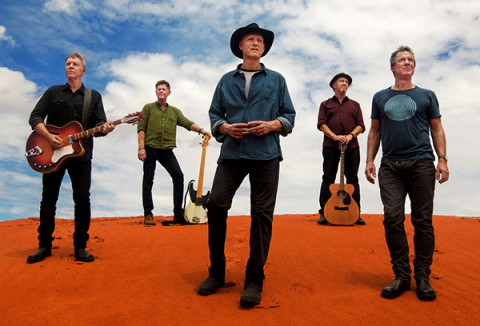
Legendary Australian rock band Midnight Oil has reformed for its first global tour in more than 20 years after frontman Peter Garrett left his music career for politics and a good decade in the Labor Party as a cabinet minister. The man who sang fiercely about protecting the environment, Aboriginal rights, anti-jingoism and more — and served as president of the Australian Conservation Foundation for 10 years combined — infiltrated the policy makers and became one of them.
The tour announcement calls Midnight Oil “agitators” and says “The Great Circle 2017 World Tour (mid-April to Nov.) will see the group’s classic lineup literally circle our overheating planet for six months.” The key words aren’t “world tour” or even “classic lineup” — it’s “overheating planet.” It shows that Garrett, drummer Rob Hirst, guitarist Martin Rotsey, bassist Bones Hillman and guitarist/keyboardist Jim Moginie may be older but they’re not resigned, even if they are issues they’ve been railing about for close to 40 years.
The band released its self-titled debut in 1978 and went on to sell more than 12 million albums worldwide, before Garrett, ever involved with social and political issues beyond just singing about them, said goodbye to recording and touring in 2002 with the album Capricornia.
Midnight Oil only reunited for two charity concerts, 2005’s WaveAid at the Sydney Cricket Ground which raised money for the victims of the Asian Tsunami, and 2009’s Sound Relief at the Melbourne Cricket Ground, which benefitted the Red Cross Victorian Bush Fire Appeal.
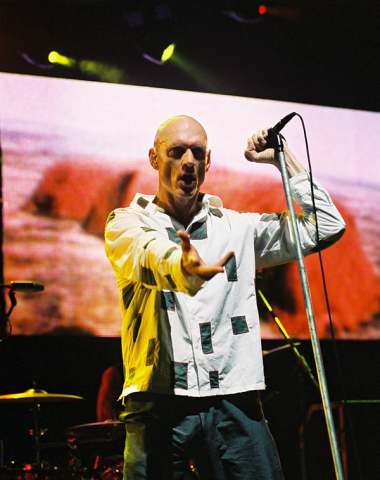
After the Labor Party got into power in 2007, Prime Minister Kevin Rudd appointed Garrett Minister for the Environment, Heritage and the Arts from 2007 to 2010. When Julia Gillard became PM, he was made Minister for Environment Protection, Heritage and the Arts for six months in 2010, then sworn in as Minister for School Education, Early Childhood and Youth from late 2010 until 2013, retiring just before the next federal election.
In 2015, Garrett released his memoir, Big Blue Sky, and last year put out his debut solo album, A Version of Now, and toured Australia with his band the Alter Egos.
This year’s reformation of Midnight Oil also meant mining the vault for the release of three box sets, May 5, via the band's long-time record label, Sony Music: the remastered CD box set, The Full Tank, featuring all of their existing albums and EPs; the 4 CD/8 DVD collection, The Overflow Tank, containing over 14 hours of previously unreleased and rare material, plus a vinyl collection with 11 remastered LPs and two 12” EPs.
In keeping with Midnight Oil’s values, their carbon footprint during The Great Circle World Tour will be fully offset and sustainability initiatives will be undertaken at all shows. The band will also partner with local and international environmental organizations, such as Greenpeace, supporting campaigns on combating climate change and the imminent threat to Australia’s Great Barrier Reef.
In a Canadian exclusive, Garrett spoke with Samaritanmag from Australia about his time in politics, what he accomplished, the purpose of a song, and also learned of The Tragically Hip’s Gord Downie taking up the mantle for reconciliation in Canada, noting the similarities between our two countries.
There are a lot of musicians that write about political and social issues, but they don't normally go into politics. What did you discover after 10 years in parliament? Can you accomplish more from the inside?
I don’t think that there’s simple formula for getting things done inside or outside. I think both places are places that you can do that work. I'd spent a whole lot of time, particularly in the later stages of Midnight Oil's touring career, as a conservation activist. I headed up the big national environment organization [Australian Conservation Foundation] here for about nine years as well, so I’d seen both of the good and the bad and the ugly side to what governments can do, but at the end of the day, they are responsible for, in our country at least, legislating big changes. Sometimes those changes come about because the policies have been formulated by the party; sometimes they come about because musicians and activists and citizens have been advocating for them, but one way or the other you can see that in our systems governments play a pretty important role, so hence my decision to take that opportunity.
To answer your question, the short answer is yes. With a reformist social democrat government, I served two terms in the cabinet and one term in opposition, and there’s a whole bunch of things that we did that I am very proud of, but there were also some things that didn’t get done and not every step along the way was pretty to watch.
So tell me what you are most proud of, what you accomplished?
Probably the thing that stands out is we basically, along with the Prime Minister — we had a female Prime Minister [Julia Gillard] who I supported strongly in our second term — and I was the Education Minister so I had responsibility for the school system federally, and we essentially introduced a completely different way of funding schools that was based on need, in order to reduce what was a huge equity gap between poor students and students from better-off backgrounds in the country. That, and taking the Japanese to the International Court of Justice over scientific whaling [killing whales for scientific purposes and controversial loophole that is exploited] and winning that case, when I was the Environment Minister are probably the two things that stand out when I’m chatting to you.
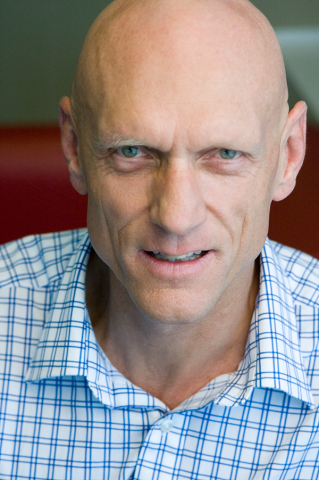
Yeah, look, a song is a song; it's not a political manifesto or an agenda, and quite often it’s important to write and sing those things and what we sang about was incredibly important to us. Now some of those things did pop up [in parliament], particularly around Aboriginal Peoples' rights and opportunities. I was pretty active in that area the whole time that I was in the parliament. For example, we created these things called Indigenous Protected Areas. They’re really just large areas of what originally would have been, I guess tribal land for want of a better way of putting it in your terminology, which the government would essentially repurpose and provide resources for Aboriginal and [Torres Strait] Islander communities to manage large waves of country, and employ the young people in a range of different skills, mainly to do with natural resource management. That was pretty important.
We legislated a resale royalty for visual artists [Resale Royalty Scheme], which is kind of interesting because in Australia at least, unlike writers, authors or even songwriters, our visual artists — our painters and sculptures and so on — didn’t receive any benefits once their work was resold on a secondary remarket. So we introduced a resale royalty scheme so they got a small percentage of any subsequent sale, but that was particularly important for Indigenous artists. Quite often their work would be sold very cheaply in the first instance, and then a couple of years later you’d find them popping up in art galleries in, you know, Toronto, New York and Paris, for vastly increased sums of which they never saw any money at all.
On climate change, of course, which was the reason essentially that I entered the parliament, we were able to, after a great deal of turning, trying, introduced essentially a carbon tax. So in opposition, I had responsibility for developing that policy. That was interesting to get to the guts of the policy in a way that obviously with music you tend to be broad brush and looking for the right kind of figurative language, but when you try and figure out how the whole system works, and where are all the levers and the buttons exist within a complex modern economy, you've got to figure that stuff out, so I enjoyed that intellectual challenge. Unfortunately we then had the replacement when we lost government two-and-a-half years ago or three years ago, by a conservative government which tried to undo some of these things and succeeded in some instances and hasn't in others. So sometimes it's a step forward and two back, and sometimes it two forward and one back, but, look, overall absolutely no regret.
Speaking of one step forward two back, we experience that here in Canada when there is a change of government. Of course, in the U.S. Trump thinks that climate change is a hoax invented by the Chinese.
Garrett laughs.
Interestingly in Canada, there is finally considerable attention now to reconciliation and a better understanding among Canadians of what our government put Indigenous Peoples through. You were on that Roadside Attraction tour in Canada with The Tragically Hip [1993]. You may know [lead singer] Gord Downie has brain cancer, and in the months since he announced that, he set up a fund [The Gord Downie and Chanie Wenjack Fund] for reconciliation. What you were doing in Australia 30 years ago, he is now doing here, educating white Canadians about residential schools and Indigenous kids ripped from their families and sent away to schools to be assimilated. He is really bringing it to the forefront. What were you able to do? It’s amazing to think it was 30 years ago that you were singing about those issues and talking about them.
Yes [laughs]. Look, I followed what Gord has been doing from the distance. It’s an incredible sort of end-of-working-life huge plan. I’ve got a lot of respect for that activity.
But, look, I guess in that area just essentially continuing to talk strongly in favour of reconciliation, looking at the practical measures that are important. Particularly for our remote Aboriginal communities, education is one of the most important things and ensuring that they have rights to land and that their rights to land are unrestricted. I’m strongly involved in the campaign now for Constitutional Recognition, to recognize Aboriginal and allow Islander people in our Constitution. That may lead, and probably will lead, in the coming years to some discussion about whether we do in fact have a treaty or some form of agreement or settlement here. It's pretty contentious. The Right hates the idea, but I think our history will march over that at some point and, hopefully, sooner rather than later.
Of course, the other thing is really encouraging musicians when I was Arts Minister, I had a special program [Breakthrough] that supported up and coming Indigenous artists. We provided them with some resources to make music and it’s been just incredible to see some of them go on to the big and brighter things.
It’s a new generation now since Midnight Oil was bringing the treatment of First Nations Peoples to the public’s attention globally. We love Gord and The Tragically Hip here in Canada so people are paying attention. Plus with the internet, we see photos and videos and news stories of people living in remote communities with no access to clean running water or reasonably priced produce; who have addiction issues, a high rate of suicide and no high schools. Deaths in fires on reserves are also high because of inadequate emergency services. It’s shocking people and we want to help. What is it like in Australia? Has public opinion changed?
Look, there’s quite a lot of similarities between the two countries. Our systems are not altogether different and the short answer is that, yeah, it's changing slowly. I think attitudes are more positive than they have been, but we have really significant structural issues in terms of service delivery, incredible the sidelining of Aboriginal voices sometimes through the media and in government — although that is also changing. We have a number of Aboriginal members of the State Legislature in the Northern Territory, so in the far north of the country, much less so in the south.
I think there are two things at play. One is you’ve got to urgently address things that aren’t working, but you have to do it with Indigenous people. It's never a place of telling people who are coming up with a solution what will or what will not work and, having been in government, I saw close of hand how ineffective and hopeless it can be doing some of those things. So that’s important and we should always have that laser-like focus on those things so we can stand up for people's interests and rights. On the other hand, that slowly — and it’s too slow — but slowly we are seeing increasing awareness of the problems. We do have a growing Aboriginal middle class here, but we also still have some really big issues around youth incarceration, youth suicide, and obviously life expectancy remains a real blight on the landscape.
Very similar here. I understand you are writing new material, as much as you are rehearsing all the old stuff. True?
No, well, we haven't formally started writing again. people individually will do their bits and pieces, but whether we get around to recording sooner or later is still pretty much an open question. It’s the kind of thing that you really don’t want to force, especially after such a long time of people doing other things, but we’ve been running down songs in the studio, getting ready to go out and play. There are about 160 songs in the songbook [chuckles], including songs that probably people have never heard before, so they are just playing the stuff around.
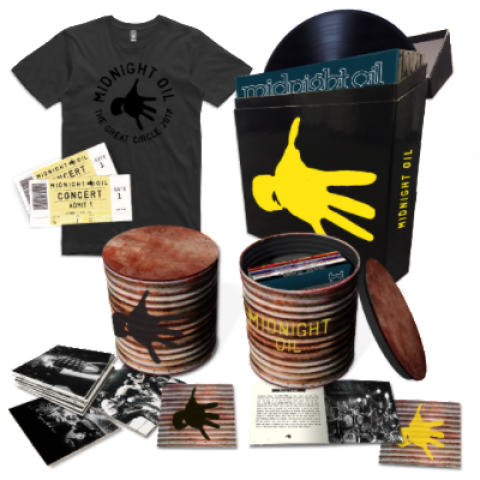
Yeah, no, exactly yeah. It’s a chance to do all that as well and sit there, smile or grimace, and think, ‘Ooh, what were we thinking?’ [laughs]
But the solo album that you put out last year, you're still writing about activism, songs like "It Still Matters” and "I’d Do It Again.” When you do write a song about a social issue, environmental, political, obviously that’s your interest, but what is your hope? What would be the ultimate response you’d like to get from a listener?
Look, I think the songwriting process is a quite an unconscious one, and I didn't really expect to do that record. Those songs just sort of popped out of the sky in some ways. That was just a distillation of all of the experiences I’ve had had particularly when I was in formal politics, but the things you want people to do is just to let the music kind of infect them in a healthy way.
So you are not trying to inspire them, to activate them to explore more and go back and investigate those issues that you are singing about?
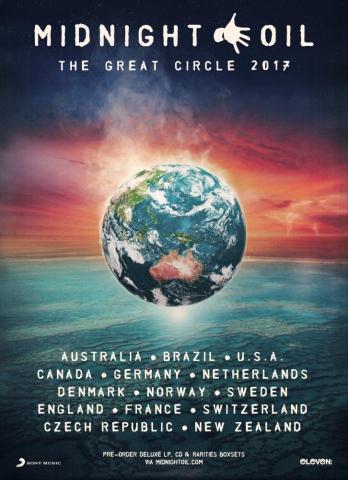
Before we wrap up, I wanted to ask you about Trump. Some people are saying in a way he is riling people up. People are protesting and perhaps that will inspire more young people to get into politics. Do you think that will happen because last election people were like, “Really? These are our best candidates?” We had the same issue in Canada.
Yeah exactly. Crossing your fingers as to whatever craziness can happen everyday [we both laugh], that it is such a clear thing where everybody —wherever they live, whatever they are doing, but particularly in the States and North America — has got to walk outside and switch off their machines and get active. People are going to see that happening in all kinds of different ways, both on the street, in non-government organizations, civil society, politics. He could be a game changer in ways he can't quite imagine.
Well thank you for your time and a great conversation.
Yeah, and, look, I saw your Samaritan work and I think it's pretty good, so good on ya.
On his web site, Garrett answers the question "Was it worth it?" with short and long lists of his accomplishments.
Below are the short lists followed by a link to the long lists.
2007-10: Environment, Heritage and the Arts
The short list:
Successful historic challenge to Japanese so called ‘scientific whaling’ whaling in the International Court of Justice.
Record level investment in resourcing and protecting national parks and reserves, new Indigenous Protected Areas, and the Great Barrier Reef.
Securing agreement for the first national e-waste recycling scheme for computers and televisions.
Getting the ball rolling for a world’s best marine reserve system, including declaration of nearly a million square kilometres for the Coral Sea Conservation Zone.
Handing back vulnerable sections of Malabar Headland to the NSW government as national park.
Stopping the Traveston Dam in Queensland.
Legislating a Resale Royalty Scheme for visual artists.
Increasing the arts budget and getting more artists into schools to encourage and inspire young people.
Successful nomination of Ningaloo on the World Heritage list, and the Kimberley region on the National Heritage list.
2010-13: School and Early Childhood Education
The short list:
Securing agreement for the first time to a national curriculum.
Legislating, again for the first time, a national, needs-based funding model for school education – the Gonski reforms.
Introduction of a Safe Schools Hub, accelerating the effort on addressing bullying in schools
Establishing the inaugural national set of teacher standards